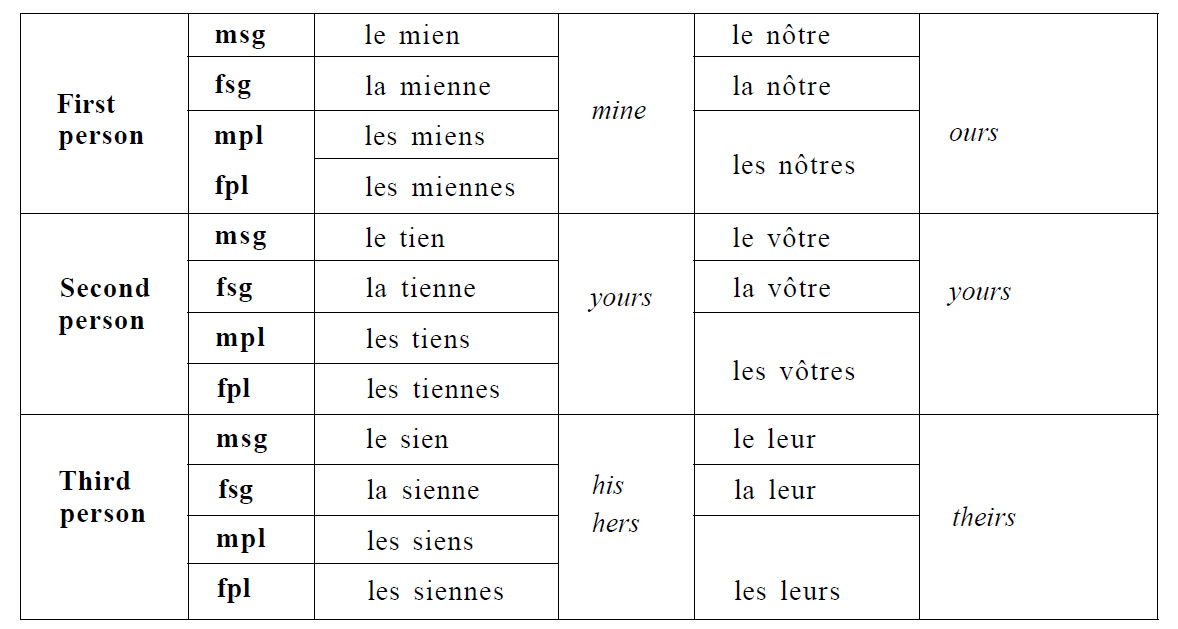Difference between revisions of "Language/French/Grammar/Possessive-pronouns"
Jump to navigation
Jump to search
m (Quick edit) |
m (Quick edit) |
||
| Line 1: | Line 1: | ||
[[File:French-Language-PolyglotClub.png|thumb]] | [[File:French-Language-PolyglotClub.png|thumb]] | ||
<div | <div class="pg_page_title"> Possessive pronouns</div> | ||
__TOC__ | __TOC__ | ||
| Line 30: | Line 30: | ||
==Video== | ==Video== | ||
<youtube>https://www.youtube.com/watch?v=pG5yPBiI2Kg</youtube> | <youtube>https://www.youtube.com/watch?v=pG5yPBiI2Kg</youtube> | ||
<youtube>https://www.youtube.com/watch?v=NG02VHxcD2g</youtube> | <youtube>https://www.youtube.com/watch?v=NG02VHxcD2g</youtube> | ||
| Line 51: | Line 50: | ||
<youtube>https://www.youtube.com/watch?v=EbSdH7l8Nqw</youtube> | <youtube>https://www.youtube.com/watch?v=EbSdH7l8Nqw</youtube> | ||
== | ==Other Lessons== | ||
* [[Language/French/Grammar/Plural-forms-of-adjectives-—-Adjectives-which-end-in-al|Plural forms of adjectives — Adjectives which end in al]] | * [[Language/French/Grammar/Plural-forms-of-adjectives-—-Adjectives-which-end-in-al|Plural forms of adjectives — Adjectives which end in al]] | ||
* [[Language/French/Grammar/Verbs-with-prepositions|Verbs with prepositions]] | * [[Language/French/Grammar/Verbs-with-prepositions|Verbs with prepositions]] | ||
| Line 67: | Line 66: | ||
* [[Language/French/Grammar/Position-of-object-pronouns-with-faire,-laisser,-envoyer-or-verbs-of-perception-+-infinitive|Position of object pronouns with faire, laisser, envoyer or verbs of perception + infinitive]] | * [[Language/French/Grammar/Position-of-object-pronouns-with-faire,-laisser,-envoyer-or-verbs-of-perception-+-infinitive|Position of object pronouns with faire, laisser, envoyer or verbs of perception + infinitive]] | ||
* [[Language/French/Grammar/Easy-way-of-generating-the-imperfect-tense|Easy way of generating the imperfect tense]] | * [[Language/French/Grammar/Easy-way-of-generating-the-imperfect-tense|Easy way of generating the imperfect tense]] | ||
<span links></span> | |||
Latest revision as of 13:55, 27 March 2023
Possessive pronouns
Summary table of possessive pronouns[edit | edit source]
Possessive pronouns agree in gender and number with a noun mentioned or implied elsewhere in the discourse:
- Voici ta clef. Rends-moi la mienne
Here is your key. Give me back mine
- Il portait un chapeau qui n'était pas le sien
He was wearing a hat which wasn't his
- Ils ont emporté mes notes, mais j'ai gardé les leurs
They took away my notes, but I kept theirs
- Tu ne peux pas prendre ceux-là, ils ne sont pas à nous. Ce sont les leurs
You can't take those, they don't belong to us. They are theirs.
- Vos idées ne sont pas toujours les nôtres
Your ideas aren't always the same as ours
les siens also has the special meaning of 'one's family': On travaille pour les siens 'People work for their families', and les nôtres can mean 'with us', as in:
- Elle n'était pas des nôtres
She wasn't with us
Video[edit | edit source]
Videos[edit | edit source]
LIVE: French possessive pronouns - YouTube[edit | edit source]
French Possessive Pronouns - Le mien Le tien // French Grammar ...[edit | edit source]
Practise your French Possessive Pronouns - YouTube[edit | edit source]
French Masculine Singular Possessive Pronouns - YouTube[edit | edit source]
Possessive Pronouns in French - YouTube[edit | edit source]
Other Lessons[edit | edit source]
- Plural forms of adjectives — Adjectives which end in al
- Verbs with prepositions
- How to use Have
- Well Better Worse
- Pronominal verbs and body parts
- Plurals of nouns ending in s, x, z
- Number differences between French and English nouns
- Future Tense
- Easy future
- Position of more than one object pronoun with faire etc. + infinitive
- Omission of the article in compound nouns linked by à
- Easy way of generating the imperative mood
- Hyphens in Cardinal Numbers
- Position of object pronouns with faire, laisser, envoyer or verbs of perception + infinitive
- Easy way of generating the imperfect tense

